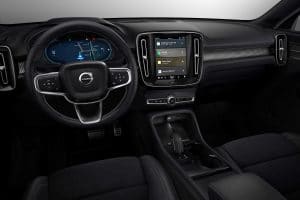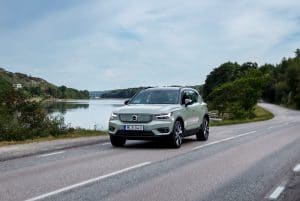
Volvo’s designers and engineers are studying the wider use of sensors to alert drivers to the threat posed by the use of smartphones and touch screens.
Distraction has become a fact of life, but Volvo’s safety research and behavioral science work suggests that when used correctly, modern technology inside the car can reduce distraction, boost road safety and help people to be better and more focused drivers.
“It is easy to think that phones and screens are the only scourge of the modern driver, but life as a whole is distracting,” said Malin Ekholm, head of the Volvo Cars Safety Center.
(Volvo launches production of XC40 Recharge, its first long-range BEV.)
“We know people do not get distracted on purpose, but it happens. You could be late for daycare and somewhat stressed. Or you get behind the wheel after a bad day at work. All this affects you as a driver,” she said.

She said Volvo Cars concluded that distraction should also be addressed via in-car cameras and other sensors that monitor the driver. With such technologies, if a clearly distracted or intoxicated driver does not respond to warning signals and risks a serious, potentially lethal accident, the car could intervene.
Such intervention could involve limiting the car’s speed, alerting the Volvo on call assistance service and, as a last resort, actively slowing down and safely parking the car. Volvo Cars plans to start introducing these cameras on the next generation of Volvo’s scalable SPA2 vehicle platform.
Another step that Volvo is taking is limiting the speed of its vehicles to the equivalent of 110 miles per hour, she noted during the first “Volvo Studio Talk” with other safety advocates that discussed distraction and several other pressing road safety issues.
(Volvo may add new all-electric XC20 SUV.)
“The reality is that people want to engage with friends, family, work and entertainment, and everyone responds differently to distraction,” said Ekholm.
“So we want to meet our customers where they are, not where we want them to be. That is why our focus is on using technology in the right way, so we can use it to help you stay safe behind the wheel,” she said.

Volvo Cars actively uses technology to combat the dangers of distraction and build some of the safest cars on the road. For example, its active safety systems with autobrake and steer assist are designed to be on guard to help drivers if they lose concentration or are distracted for a split second.
Inside the cabin of the new XC40 Recharge, an advanced voice control on Volvo Cars’ new Android-powered infotainment system allows drivers to control the temperature, set a destination, play their favorite music and podcasts or call their mom on her birthday – all while keeping their hands on the wheel, she added.
(Volvo moves forward with plans to build batteries.)
“Being able to control key features on your Volvo by voice allows you to keep your hands on the wheel and your eyes on the road,” said Ekholm. “Active safety systems such as City Safety, Run-off Road Mitigation and Oncoming Lane Mitigation with steer assist can act as an extra pair of eyes watching over you.”







